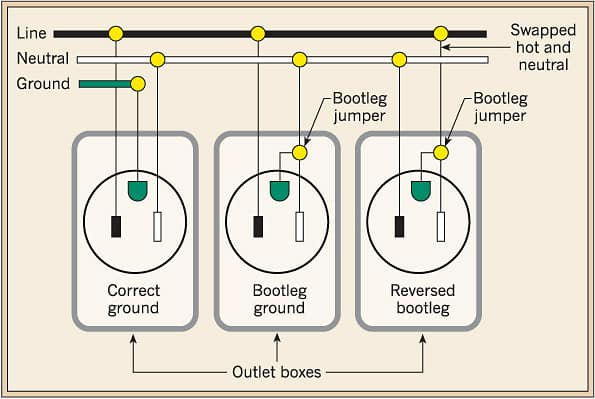Is a surge protector’s reading sufficient to be safe from “hot skin”?
Most of the time it's safe. But there's one dangerous miswiring condition that a Surge Protector can't warn you about or disconnect you from. I've named it a Reverse Polarity Bootleg Ground (RPBG)...
Dear Mike,
Thank you so much for your discussion of “hot skin.” I recently got a shock touching my small trailer and found out I had a bad extension cord.
A question: I use a surge protector between shore power and my trailer. The protector claims to detect lack of power, reversed polarity, open neutral and open ground conditions (using a series of green and red lights). I sometimes plug into a friend’s “garage” power outlet while camped in their driveway. Can I assume if the protector says I have power, correct polarity, no open neutral and no open ground that I am good regarding hot skin? Or is it still prudent to do your test? Thanks. —Lou
Dear Lou,
While most wiring failures can be found with a Surge Protector’s analyzer lights, there’s one really dangerous wiring condition that they can't warn you about or protect you from. It’s something I've named a Reverse Polarity Bootleg Ground (RPBG).
What’s an RPBG?
An RPBG (Reverse Polarity Bootleg Ground) occurs when a DIY electrician tries to upgrade an old 2-prong ungrounded outlet with a 3-wire grounded outlet without running a new ground wire. They can do something called a Bootleg Ground which is a jumper between the ground and neutral screws on the outlet. That’s a code violation that’s not immediately dangerous unless a neutral opens. However, if the DIY installer also get the Hot and Neutral conductors reversed, then the incoming 120-volt hot conductor will be directly connected to the chassis of anything plugged into it that has a ground plug..
Why is it dangerous?
If your RV is plugged into an RPBG miswired outlet with a dogbone adapter, then the chassis and skin of your RV will be electrified with 120-volts and 20- or 30-amps of available fault current. But everything would appear to operate normally without any visible signs that touching the RV skin or chassis could result in electrocution.
While an outlet with Reverse Polarity Bootleg Ground (aka RPBG) wiring should be uncommon and close to impossible at new campgrounds, they can happen surprisingly often in old basement and garage outlets inside houses built prior to 1960. So, plugging into your friend’s garage power while camped in his driveway could be dangerous.
More details
Take a look at this article I wrote for Gary Bunzer (The RV Doctor) where I introduce the idea of an RPBG (Reverse Polarity Bootleg Ground).
And here’s the extended version of the article I wrote to Electrical Construction & Maintenance (EC&M) Magazine.
How to test for an RPBG…
Currently, standard test gear and methods cannot detect the hot-ground created by an RPBG miswired shore power outlet. And plugging your RV into one will certainly energize the skin and chassis of your camper to a full 120-volts with circuit breaker current of 20 or 30 amps.
Also, even if your surge protector gives you the “all clear,” it’s still possible for your RV to develop an open safety ground internally due to vibration or corrosion. That’s why I think that using a simple NCVT (Non-Contact Voltage Tester) to test the chassis/skin of your RV after you plug it into shore power is a great safety check.
And, of course any time you feel the least little shock while touching your RV means there’s something wrong with the grounding system of your shore power. It could be anywhere from the pedestal to an extension cord or any dog-bone adapter in the power line.
Let’s play safe out there… Mike











Mike, since this hot skin can happen anytime from conditions at another rv, how about a warning light setup. I'm thinking a tent stake or screwdriver in the ground. Then a wire with a low voltage light running from there to the rv skin, rv ground.
Would that work to indicate hot skin condition?
Gil
Thanks Mike. It’s always great to be reminded about reversed polarity bootleg grounds. They are even more insidious and dangerous because they are uncommon and so easy to forget to check for them. You provide such great info to our community!